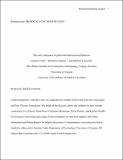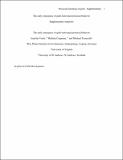Files in this item
The early emergence of guilt-motivated prosocial behavior
Item metadata
| dc.contributor.author | Vaish, Amrisha | |
| dc.contributor.author | Carpenter, Malinda | |
| dc.contributor.author | Tomasello, Michael | |
| dc.date.accessioned | 2018-11-07T00:47:41Z | |
| dc.date.available | 2018-11-07T00:47:41Z | |
| dc.date.issued | 2016-11-07 | |
| dc.identifier | 214244841 | |
| dc.identifier | 495b51e0-354d-41cc-85eb-049e5d73800d | |
| dc.identifier | 84994234891 | |
| dc.identifier | 000387436300011 | |
| dc.identifier.citation | Vaish , A , Carpenter , M & Tomasello , M 2016 , ' The early emergence of guilt-motivated prosocial behavior ' , Child Development , vol. 87 , no. 6 , pp. 1772-1782 . https://doi.org/10.1111/cdev.12628 | en |
| dc.identifier.issn | 0009-3920 | |
| dc.identifier.other | ORCID: /0000-0003-3983-2034/work/64697980 | |
| dc.identifier.uri | https://hdl.handle.net/10023/16403 | |
| dc.description | Amrisha Vaish was supported by a Dilthey Fellowship from the Volkswagen and Fritz Thyssen Foundations. | en |
| dc.description.abstract | Guilt serves vital prosocial functions: It motivates transgressors to make amends, thus restoring damaged relationships. Previous developmental research on guilt has not clearly distinguished it from sympathy for a victim or a tendency to repair damage in general. The authors tested 2- and 3-year-old children (N = 62 and 64, respectively) in a 2 × 2 design, varying whether or not a mishap caused harm to someone and whether children themselves caused that mishap. Three-year-olds showed greatest reparative behavior when they had caused the mishap and it caused harm, thus showing a specific effect of guilt. Two-year-olds repaired more whenever harm was caused, no matter by whom, thus showing only an effect of sympathy. Guilt as a distinct motivator of prosocial behavior thus emerges by at least 3 years. | |
| dc.format.extent | 11 | |
| dc.format.extent | 303950 | |
| dc.format.extent | 217100 | |
| dc.language.iso | eng | |
| dc.relation.ispartof | Child Development | en |
| dc.subject | Guilt | en |
| dc.subject | Prosocial behavior | en |
| dc.subject | Sympathy | en |
| dc.subject | BF Psychology | en |
| dc.subject | NDAS | en |
| dc.subject.lcc | BF | en |
| dc.title | The early emergence of guilt-motivated prosocial behavior | en |
| dc.type | Journal article | en |
| dc.contributor.institution | University of St Andrews. School of Psychology and Neuroscience | en |
| dc.contributor.institution | University of St Andrews. Centre for Social Learning & Cognitive Evolution | en |
| dc.identifier.doi | https://doi.org/10.1111/cdev.12628 | |
| dc.description.status | Peer reviewed | en |
| dc.date.embargoedUntil | 2018-11-07 |
This item appears in the following Collection(s)
Items in the St Andrews Research Repository are protected by copyright, with all rights reserved, unless otherwise indicated.


